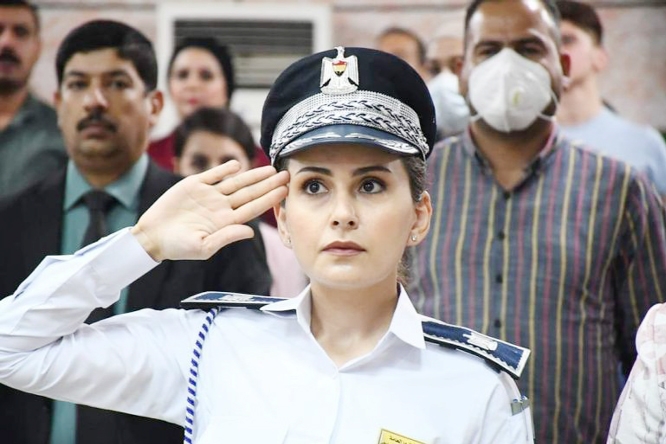
Al Jazeera :
When Saja al-Abayji joined the police academy, she was uncertain about managing the stringent military-like drills, and anxious over society’s perception of women joining the police force.
Her class in 2011 was only the second to see a selection of female officers graduate alongside hundreds of men who planned to serve in the Iraqi ministry of interior (MOI) to oversee policing and border control in the country.
But a decade later, the 34-year-old is now a senior traffic officer, having served for years in the General Traffic Directorate in the Iraqi capital, Baghdad. Instead of being part of a selection of women in Iraq’s internal security forces, al-Abayji is one of hundreds of female officers who have taken up a variety of roles in Iraq’s policing and border control.
Speaking from her office in central Baghdad, al-Abayji said as the number of policewomen on the streets of Iraq grew over the years, society slowly changed its conservative views on women’s role in law enforcement.
“People thought women wouldn’t succeed in the police force, believing that it wasn’t our place to be there. And so, we [female officers] received lots of discouraging words,” said al-Abayji, explaining many people saw them as “intruders” in the field.
“But with time, society began to see things in a different light.”
While Iraqi women have been global pioneers in all walks of life – medicine, engineering, and the arts – and have served as government ministers and members of the military and civil service, the Iraqi MOI’s agencies – the police, highway patrol, traffic department, and border enforcement, to name a few – did not have any female officers until about a decade ago.
The Iraqi ministry of interior’s agencies, including the police, highway patrol, traffic department, and border enforcement, did not have female officers until a decade ago [
Al-Abayji said many of her female peers dropped out of the Higher Institute for Security and Administrative Development during their training at the police academy because their families were not supportive of their career choices.
“This reflected where society stood at the time with regards to the role of women,” explained al-Abaiji, who luckily found her greatest support from her family and fiancé at the time.
“When I finished my degree in computer science, it was my family and now husband who encouraged me to apply to the institute,” said al-Abayji. “If it wasn’t for them, I wouldn’t have been able to cope with all the negativity around me.”
Despite this, al-Abayji found the road to becoming a police officer difficult and full of challenges.”Initially, I never shared what I did with people I’d just met. I also never wore my police uniform to and from work – not only for security reasons, but also because I wanted to hide,” she said. “I just didn’t want to be judged.
“But one day, I asked myself why is society so proud of the men who do the exact same job as me? I realised I have to open up to change people’s opinion,” she told Al Jazeera. The other main challenge for al-Abayji was getting accustomed to her new role and duties.
When starting her training at the institute, al-Abayji said “the idea of handling a weapon and dressing in a masculine-looking uniform was very hard.

